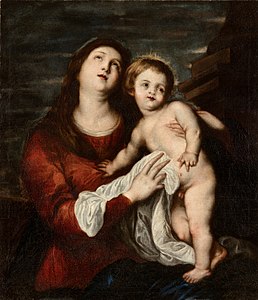Museum Cerralbo
History

Enrique de Aguilera y Gamboa, the Marquis of Cerralbo, opened the place as private gallery in 1893.
After the Spanish State accepted to inherit the collection in 1924, the building opened to students and researchers. The Marquis' collection was split, with a part moved to the National Archaeological Museum and the rest remaining at the building, which was constituted as a proper museum in 1944.
The building was built in the 19th century, according to Italian taste, and it was luxuriously decorated with baroque furniture, wall paintings and expensive chandeliers. It retains to a large extent its original aesthetics.
The building was protected as historical-artistic monument in 1962.
Collection
With more than 24,900 pieces, the original collection featured a large numismatics collection. The archaeology collection originally included the Greek, Roman, Etruscan and Egyptian pieces characteristic of 19th collectors, as well as items from the Iberian Peninsula (Neolithic, Iberian, Roman, Almohad) and two stone masks from Puerto Rico. The museum hosts a collection of Oriental art items, chiefly Chinese art and Japanese art.
The exhibited objects consists of items from the personal collections of the Marquis of Cerralbo and the Marquise of Villa-Huerta.
Paintings
The Marquis showed a preference for Spanish and Italian works and religious and portrait paintings. Painting works include works by Jacopo Tintoretto, Jacopo Palma the Younger, El Greco, Ludovico Carracci, Alonso Cano, Zurbarán and Luis Paret.
Gallery
-
Frans Snyders, Porcupines and vipers
-
Juan de Espinosa, Life Still with grapes and cakes
-
Luis Paret, Seascape with figures
-
El Greco, Saint Francis in Ecstasy
-
Francisco de Zurbarán, The Inmaculate Conception
-
Anton Van Dyck, La Virgen con el niño
Archaeology
The bulk of the archaeology section consists of the Marquis' numismatics collection.
Decorative arts
The decorative arts section features porcelain pieces, pottery, tapestries, carpets, furniture, lamps and jewellery.
Clocks
The museum also hosts a collection of 18th and 19th-century French and English clocks.
References
- Citations
- ^ "History of the museum and its founder". Museo Cerralbo. Retrieved 2018-02-15.
- ^ Recio Martín & Casas Desantes 2018, p. 327.
- ^ Recio Martín 2017, p. 1764.
- ^ Ortega López & Collado Moreno 2018, p. 603.
- ^ "Reabre el Museo Cerralbo tras cuatro años de obras". 20minutos.es. 14 December 2010.
- ^ Recio Martín 2017, p. 1766.
- ^ Recio Martín 2017, pp. 1766–1767.
- ^ Saiz Peña, Elena (2012), Comercio de lujo en la antigua China: una campana de bronce esmaltada (PDF), Museo Cerralbo, p. 4
- ^ Granados Ortega 2012, p. 19.
- ^ Granados Ortega 2012, p. 20.
- ^ Granados Ortega 2012, p. 21.
- Bibliography
- Recio Martín, Rebeca C. (2017). "El Museo Cerralbo y el coleccionismo decimonónico" (PDF). Boletín del Museo Arqueológico Nacional. 35. Madrid: Museo Arqueológico Nacional: 1763–1770. ISSN 2341-3409.
- Recio Martín, Rebeca C.; Casas Desantes, Cecilia (2018). "El Museo Cerralbo y la museografía original de sus colecciones arqueológicas" (PDF). V Congreso Internacional de Historia de la Arqueología IV Jornadas de Historiografía SEHA-MAN. Ministerio de Educación, Cultura y Deporte. pp. 327–342.
- Granados Ortega, M.ª Ángeles (2012). Guía breve. Museo Cerralbo. Madrid. Madrid: Ministerio de Educación, Cultura y Deporte. ISBN 978-84-8181-516-0.
- Ortega López, David; Collado Moreno, Yolanda (2018). "Arqueoturismo ¿un fenómeno en auge? Reflexiones acerca del turismo arqueológico en la actualidad en España" (PDF). Revista de Turismo y Patrimonio Cultural. 16 (3): 599–615. doi:10.25145/j.pasos.2018.16.044. ISSN 1695-7121.
See also
External links
- Official website (in Spanish)
- Cerralbo Museum within Google Arts & Culture
 Media related to Museo Cerralbo at Wikimedia Commons
Media related to Museo Cerralbo at Wikimedia Commons





